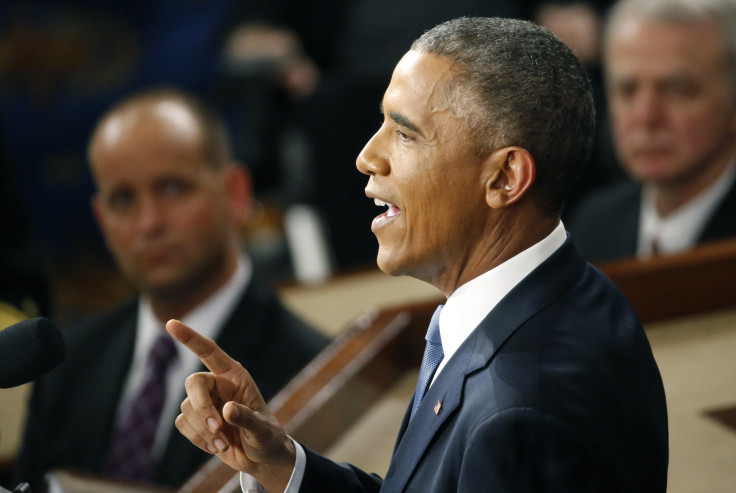Is The Economy Getting Better? What Obama's State Of The Union Left Out

Rebekah and Ben Erler became the faces of President Barack Obama’s economic policy after he shared the Minnesota couple’s tale of financial recovery during his State of the Union address on Tuesday. But the Erlers rebounding fortunes -- Rebekah took out loans for community college to change her career as Ben’s construction jobs became fewer during the economic slowdown -- isn’t shared in places like Laramie, Wyoming, where the Laramie Soup Kitchen served 4,000 more meals in 2014 than the previous year, or in New York City, where more employed adults use soup kitchens and food pantries than the homeless.
"If there is a rising tide, it has yet to lift all boats," said Triada Stampas, vice president for research and public affairs at the Food Bank For New York City. "So we know that one in five adults who use food pantries in New York City has a job and they're just not earning enough to make ends meet. Being employed is not a guarantee that you're food-secure."
Throughout his State of the Union speech, Obama referred to the economy as "growing." But some indicators, like the employment rate, are misleading. The 5.6 percent unemployment rate touted during the State of the Union would rise to 9.1 percent if it took into account so-called “missing workers,” or potential job seekers who stopped looking for employment because they don’t have good options, according to the Economic Policy Institute. These people are not included in unemployment figures because they are not considered active job seekers.
“In today’s labor market, the unemployment rate drastically understates the weakness of job opportunities,” the institute said in a press release earlier this month. “This is due to the existence of a large pool of ‘missing workers’ -- potential workers who, because of weak job opportunities, are neither employed nor actively seeking a job. In other words, these are people who would be either working or looking for work if job opportunities were significantly stronger.”
While the economy has improved since Obama took office in 2009, many Americans in cities and towns across the nation are still struggling. In Kentucky, a number of factories have relocated from Mooreland in recent years, including Nestle USA’s expansion of its plant in nearby Mount Sterling. Jobs that are available aren’t highly desirable, according to an employee at the Kentucky Career Center in Morehead. “Most of the people around here are not what you’d call highly educated,” she said. “They have a high school diploma -- if that -- or they’re getting work in a low-class or middle-economy type situation.”
Emily Madden, executive director of the Laramie Soup Kitchen, said most patrons are men between the ages of 36-45, according to a recent quarterly client survey. While the survey didn’t ask why people sought out the soup kitchen, Madden suspected that the men were either looking for employment or underemployed.
“The comments we hear [are], ‘We’re just in hard times,’” she said. Albany County, Wyoming, which includes Laramie, has a poverty rate of 26 percent, more than double that of the rest of Wyoming. “There really just aren’t high-paying jobs here like there are in other parts of the state,” Madden said.
In 2010, the soup kitchen provided 13,000 meals. In 2014, it served 23,500. Madden said part of the spike is attributed to the outreach the soup kitchen has done with the nearby University of Wyoming and Wyoming Technical Institute.
Demand at New York City-area food pantries and soup kitchens has soared since food stamps were cut last year. More than half of the city's 900 food pantries and soup kitchens said in September that they were running short on food, according to Stampas. "As a result, more people are getting turned away for lack of food," she said. Also contributing to increased need is the high cost of living in a city like New York. To qualify for food pantry access, city residents have to have an income equal to 185 percent of the federal poverty level, which ranges from $21,579 for an individual to $74,167 for a family of eight, but New Yorkers need to make more than that amount just to take care of their basic needs like rent and transportation, Stampas said.
Some of Obama's proposals outlined in the State of the Union, like a higher minimum wage, paid sick leave, affordable child care and free community college, would help ease the burden on food pantries and soup kitchens but not entirely alleviate it, according to Stampas. "There was an excellent vision layed out there ... but what we didn't hear in the State of the Union was the need for a stronger anti-hunger safety net," she said.
© Copyright IBTimes 2024. All rights reserved.






















